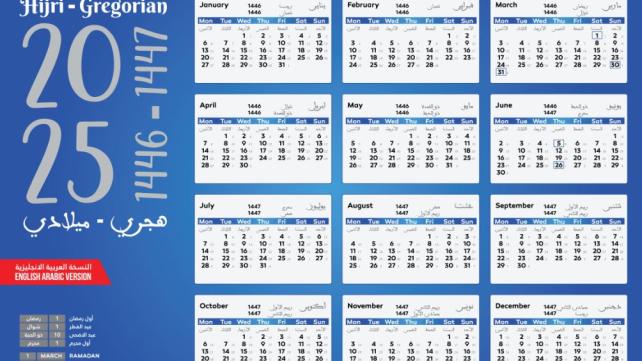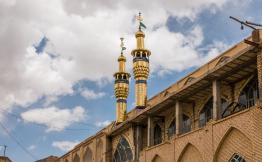
Muharram is the first month on the Islamic calendar and is a word that literally means sacred. In the Holy Quran the four sacred months are a time when warfare is prohibited.
“The year is twelve months, of which four are sacred: three consecutive months,
Dhul Qadah, Dhul Hijjah, and Muharram, and Rajab…”
(Sahih al-Bukhari, Hadith 3197).
By noting important dates on the Hijri or Islamic calendar, families can understand the history of Islam and the context for Islamic celebrations and dates of note. When we engage our children and ourselves with the Hijri calendar we connect to the larger body of Muslims and add depth to our iman – faith and belief.
There are many ways we can engage with the Hijri calendar:
Buy and Use an Islamic calendar
- When we actually have an Islamic calendar in our home, the dates of significant historical events and celebrations are highlighted.
Know your own family’s Hijri dates
- Children love to know the date of their birth on the Islamic calendar. Couples can note their marriage date. When other celebrations are noted, make a point of reminding ourselves and children what day that is on the Islamic calendar. This practice helps to create awareness and memory of the Islamic calendar as a whole.
Note the moon
- Since the Hijri or Islamic calendar is based upon the moon cycles, it is a fun and educational activity to look at the moon and note its changes. Besides making children aware of the universe they can note and anticipate upcoming months.
Use Islamic days of note or significance to stimulate conversation
- As important days emerge, families can share and contextual the religious and historical events to increase understanding of Islamic principles. Remind our families that months are mentioned in the Quran and we should note all twelve
Indeed, the number of months ordained by Allah is twelve—in Allah’s Record1 since the day He created the heavens and the earth—of which four are sacred. That is the Right Way. So do not wrong one another during these months. And fight the polytheists together as they fight together against you. And know that Allah is with those mindful ˹of Him˺
Surah Tauba 9:36
Each month has religious or historical significance:
- Muharram – the first month on the Islamic calendar. In this month the 10th of Muharram is Ashura. Fasting on Day of Ashura is highly recommended.
- Safar the second month on the Hijri calendar doesn’t have religious ritual attached to it, but historically there are significant events. Although the Islamic calendar begins with Muharram, families can discuss how it was actually during the month of Safar that the Prophet Muhammad (SAW) left his home in Makkah and migrated to Madinah.
- Rabi Awwal is the third month on the Hijri calendar and is the month in which the Prophet Muhammad (SAW) was born. Many Muslims around the world celebrate Mawlid on the 12th of Rabi Awwal even though the exact date of the prophet’s (pbuh) birth is not confirmed.
- Rabi al-Thani the fourth month on the Hijri calendar does not have specific acts of worship associated with it but is considered a month of reflection and families should engage in increased acts of worship.
- Jumada al-Awwal is the fifth month on the Hijri calendar and like the preceding month doesn’t have special rituals attached to it. However, it is historically significant because during this month the Prophet Muhammad (SAW) married Hazrat Khadijah (AS). Families can discuss her emotional and financial support of the prophet (SAW) and the spread of Islam. Other historical topics to teach and reflect include the death of the Prophet’s grandfather Abdul Muttalib and a number of companions during the Battle of Mut’ah.
- Jumada al-Thani is the sixth month on the Hijri calendar has the significant historical event of the passing of Abu Bakr (AS) one of the companions of the prophet (pbuh). Here families can reflect on his acts as the first Khalifa, his suppression of the ridda wars and the conquest in Syria and Iraq.
- Rajab is the seventh month and is one of the sacred months and also is when the historic night journey related in the Quran in Surah Al Isra
- Sha’ban is the eight month and if often referred to as the month of the Prophet. It is a time for fasting and preparing for Ramadan. Families can reflect upon one of the most significant events during this month: - the changing of the Qibla (direction of prayer) from Jerusalem to Makkah which occurred in the second year of hijra on the 15th of Sha’ban. On this night many Muslims spend the night in prayer and reciting the Quran.
- Ramadan is the ninth month – the month of fasting and families are engaged in the acts of worship through fasting, increased prayer, good deeds and acts of charity.
- Shawwal the tenth month and begins with the Eidul-Fitr, the celebration marking the end of Ramadan. Besides enjoying fasting the first six days, families can discuss historical events of the month like the Battle of Uhud or that this month marks the beginning of the hajj season.
- Dhul Qi’dah is the eleventh month on the Hijri calendar and one of the sacred months. It is also a time to prepare for hajj. Families may also reflect on the signing of the Treaty of Hudaybiyyah, which brokered peace with the Quraysh.
- Dhul Hijjah is the twelfth month on the Hijri calendar and is the time to fulfill the fifth pillar of Islam – Hajj and includes the fasting on the day of Arafah and the Eidul-Adha. Families can increase their acts of worship on the Days of Tashriq, the three days following the Eid.
Author bio: Mahasin D. Shamsid-Deen is the news curator and content manager for Muslim Network TV (MNTV) and contributing writer for Sound Vision. She holds a Master’s degree in English Writing and has worked as both a High School and College ESL Instructor and Writing Instructor for more than a decade. Mahasin has numerous published articles, books, essays and is a published playwright with three award winning stage plays. She is currently writing her dissertation for her doctoral degree.





Comments
Excellent
Thank you for writing the article
Location
Add new comment